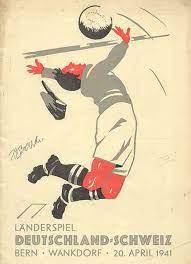
April 20, 1941: On the highest holiday of the Third Reich, of all days, Switzerland defeats Germany 2-1. Numa Monnard sends the Reich into a frenzy with two goals. Joseph Goebbels was beside himself. The Reich Minister of Propaganda wrote angrily to Hans von Tschammer, the Reich sports leader, and to the East, that in future "no sports exchange should be made if the result is in the least doubtful". Basta and Heil Hitler. Just then, the large German eleven (formed by the national teams of Germany and Austria) had lost 1:2 against Switzerland, "the little porcupine", in Bern. For the Germans, this defeat was particularly bitter because it happened on April 20, Adolf Hitler's birthday, which was the highest holiday in the Third Reich at the time. Helmut Schön (world champion as national coach in 1974), who was playing in the game at the time, later recalled, "It bordered on high treason and insult to majesty." The Germans had still led 1-0 after 20 minutes. Then the Swiss turned the game around with two goals from Numa Monnard. Before kickoff, General Henri Guisan greeted the players individually with a handshake. During the playing of the national anthems - for the guests, in addition to "Deutschland, Deutschland über alles" (Germany, Germany above everything), the Horst Wessel song, the Nazi battle song, was also played - the general remained in a position of respect. The guests from Germany flanking him stretched their arms boldly in the Hitler salute.
The pride of the little ones
The chroniclers were also urged not to irritate their powerful neighbor. One issue of the then trade journal "Le Sport Suisse" was confiscated by the Federal Commission for Radio and Press (the censorship authority) because of the match coverage and subsequently the paper was not allowed to appear for a month as a punishment. Journalist Emile Birnbaum had compared the match to the then already legendary 4-2 victory of the Swiss against Greater Germany in the 1938 World Cup in Paris. "Without a doubt, the desire to beat the Germans was great in the country. This was to be a demonstration of independence, of the will to resist as in Paris in 1938. What a unique opportunity to show our true feelings under the guise of sport. Doctors should prescribe such a spectacle every month for national hygiene."
"A new Sempach"
The reporter provoked with the language of war in the match report. He compared the Germans' strong header play to the Stuka, the dreaded dive bombers. "They probably thought their air force was decisive in soccer, too. Bern proved them wrong." The Swiss game reminded the chronicler of the fighting style of the old Confederates and Winkelried's sacrificial death in the Battle of Sempach anno 1386. "They played simple, direct, open, wide passes across the field, building up play from deep, balls everywhere to break up the German scheme, let the opponent run and create opportunities to break through. Mightily supported by the crowd, the Swiss created a new Sempach."
2 victories, 2 defeats during the war.
Switzerland played Germany four times during World War 2 under national coach Karl Rappan. On March 9, 1941, it lost 4-2 in front of 60,000 spectators in the sold-out "Adolf Hitler Kampfbahn" in Stuttgart. On April 20, 1941, the aforementioned revenge succeeded with a 2-1 win in Bern.
On February 1, 1942, the Swiss even managed a 2-1 away victory in Vienna and on October 18, 1942, the Germans took revenge in Bern with a 5-3 win. The Germans were wary of competing again on April 20.
The Swiss heroes of April 20, 1941 in Bern
Erwin Ballabio (Lausanne), Severino Minelli (GC), August Lehmann (GC), Albert Guinchard (Servette), Franco Andreoli (Lausanne), Harry Winkler (GC), Olivier Eggimann (YB), Lauro Amado (GC), Numa Monnard (Servette), Luigi Fornara (Lugano), Georges Aeby (Servette).
Source: Watson